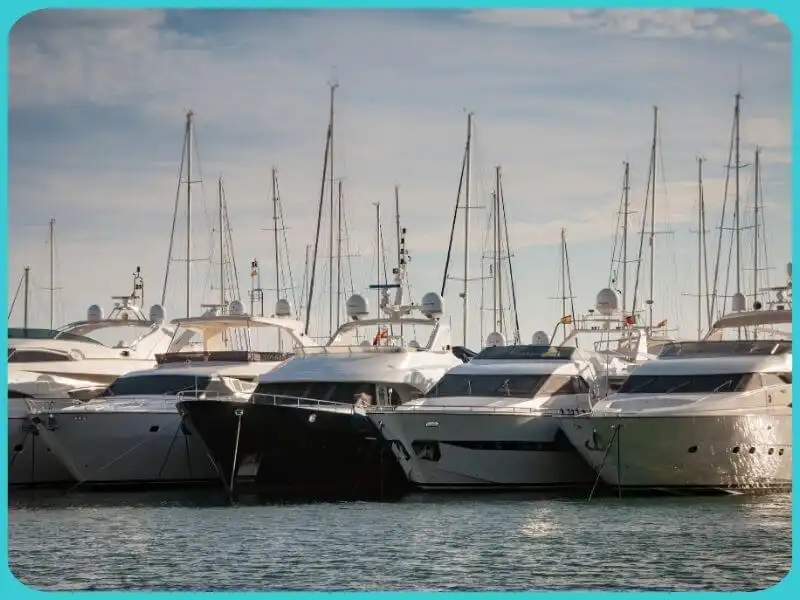
- 10.06.2025.
- News
The Swiss ruling against Booking.com challenges excessive commissions and unfair pricing practices. For the yacht charter industry, it’s a signal to reassess the growing influence of intermediaries — and reclaim control over pricing, visibility, and customer relationships.
OTA Models: When the Middleman Becomes the Main Player
Online Travel Agencies (OTAs) have reshaped how travelers book accommodations. Powered by digital platforms and heavy advertising, they’ve become the dominant sales channel for hotels, apartments, flights — and increasingly, for nautical services. The model is simple: the platform takes a percentage of each sale in exchange for visibility and technical infrastructure.
On paper, it’s a win-win. In practice, it’s not that straightforward.

The Swiss Ruling Against Booking.com: A Wake-up Call for the Entire Tourism Sector
In May 2025, the Swiss Price Supervisor ordered Booking.com to reduce its commission rates for Swiss hotels by around 25%. The ruling came after authorities found that Booking.com's business practices distorted market competition, restricted service providers’ freedom, and created an unfair advantage.
Specifically, Booking.com forced partners to offer their lowest rates on the platform, with no flexibility to set better prices on their own channels, directly affecting both profitability and control.
Switzerland has now become the first country where OTA commission structures are subject to regulatory oversight, with mandatory reductions, compliance deadlines, and a three-year enforcement period.
What Does This Mean for the Charter Industry?
From a business analyst’s perspective, this case signals the start of a more structured examination of platform dominance, not just in hospitality, but across the tourism value chain. The charter industry has long been considered “too niche” to be affected by such policies. But the parallels are undeniable: market dominance, pricing control, and limited sales autonomy all exist here too.
In yacht charter, where fixed costs are high and capacity limited, intermediary behavior often has an even greater impact. With standard commissions at 20%, the margin for sustainable operation is tight. And when major platforms discount prices by using part of their commission, their offers appear cheaper than those of the very companies operating the boats.
The result? Charter operators become uncompetitive on their own products.
This Swiss ruling, then, is not just a hotel story, it's a strategic signal for our industry: that market power, pricing rules, and fairness are absolutely legitimate topics for public debate. And that setting limits on platform behavior isn’t only acceptable , it’s responsible.
After all, when a lower price is driven not by real cost savings but by the structural invisibility of the provider, that's not a healthy market dynamic. It’s a distortion. And as we’ve just seen, it can and should trigger a regulatory response.

So, What’s Actually Happening in Yacht Charter?
While Booking.com doesn’t operate in the charter space, some of the same power dynamics already exist. There are one or two major OTA-like players who leverage strong digital tools, SEO, and aggressive marketing to position themselves as go-to booking sources.
Alongside them, there's a broader network of traditional agencies, many with loyal, long-term client bases in markets like Germany, Austria, and Italy. These agencies may not dominate the digital space, but they’re still reliable, valued partners with whom charter companies build lasting relationships.
The issue isn’t the existence of agencies it’s how some intermediaries use their position to undercut the very operators they depend on. The most problematic cases involve high commissions combined with consumer discounts, creating market conditions where direct sales lose all meaning.
A 20% commission is no longer an exception in charter, it’s the norm. Interestingly, that’s exactly the level the Swiss government just deemed excessive in hospitality. In charter, such rates are often accepted without serious questioning because they’ve become “the way things are.”
What further disrupts the market balance is the practice among some large agents to apply part of their commission as a direct discount for the end user. This makes their offer appear cheaper than any direct quote even though no one else in the chain can sustainably match it.
The consequences?
- Charter companies end up selling their own product at a higher price than agents who take zero operational risk.
- Guests begin to see intermediaries as the “fairer” or “more affordable” option, unaware of what’s actually being traded away.
- Brand value, client relationships, and long-term sales strategies start to erode, because the market rewards price, not trust, expertise, or quality of service.
- This model hurts everyone on the operator side — and eventually, it hurts the customer too, by driving out reliable providers.
The Thin Line Between Partnership and Dependency
These conditions didn’t appear overnight. They are the result of years of industry inaction when it comes to setting shared ground rules. As intermediaries grow stronger, more standardized, and digitally integrated, many charter businesses remain reactive adapting instead of leading.
That’s why the Swiss case matters here too. It proves that:
- Regulating dominant platforms isn’t taboo.
- An operator losing pricing control is not business as usual it’s a structural weakness.
- A model based solely on redirecting attention and competing on price is not sustainable.

Can We Stop This Trend, and What Can Be Done?
Rather than wait for government regulation, the charter industry has the opportunity to act proactively. Here’s how:
- Transparency in cooperation models
If discounts are being offered from commissions, this must be clearly communicated to all partners and clients. Undisclosed price manipulation undermines the market as a whole. - Industry-wide minimum pricing
With support from associations or regional clusters, price floors can be established to protect the basic profitability of yacht charters. Without coordination, the race to the bottom will only accelerate. - Stronger direct sales channels
Investing in your own website, CRM tools, guest reactivation, and content marketing isn’t optional it’s the foundation of long-term resilience. - Shared infrastructure and white-label models
Instead of every company reinventing the wheel, charter operators can adopt shared tools (like booking engines) without giving up their brand identity or autonomy. - Collective negotiation with agencies
One charter company cannot set new rules with a major OTA-like platform. But many together can.
If We Don’t Set Boundaries Now, There May Be Nothing Left to Defend
The Swiss ruling against Booking.com is not an end it’s a warning.
It shows what happens when a single actor’s market power turns into market control. In the charter industry, there is still time to take action. But the signs are clear: if we keep quiet about market practices, keep tolerating price dumping, and continue neglecting our brand visibility, more and more business will shift to those who’ve never had to maintain a boat, pay a marina, hire a skipper, or complete a check-in at peak season.
It’s time for the charter sector to speak up clearly, collectively, and without the illusion that “nothing can change anyway.”
Step one? Acknowledge that the problem exists.
Step two? Start building alternatives that don’t rely on someone else’s visibility.
Categories of trends
- News
- Sale
- Marketing
- SEO
- Web design
- Social media
- Technology
- Regulations
- Management
- Education
- Finances
- User experience
Newsletter
Sign up for the newsletter and receive the latest trends and tips straight to your inbox




